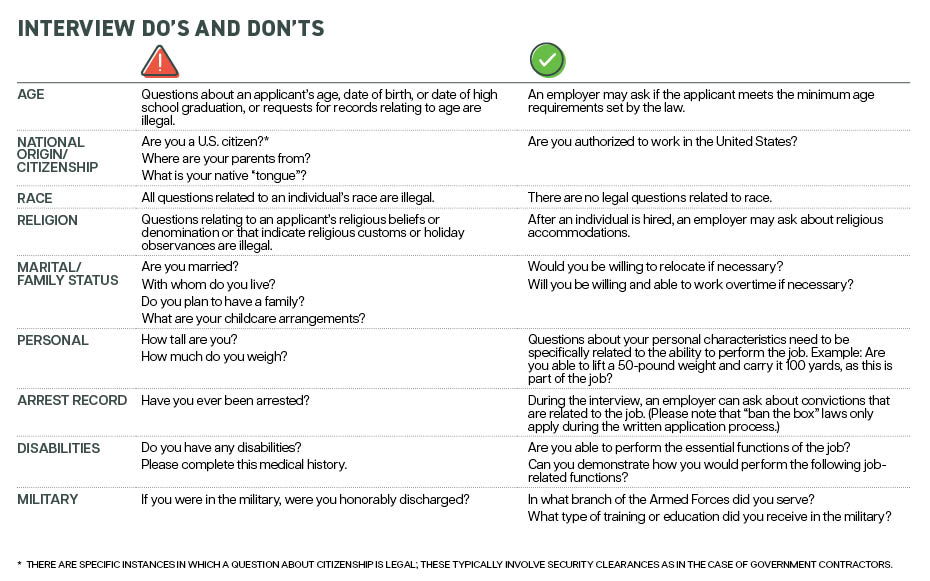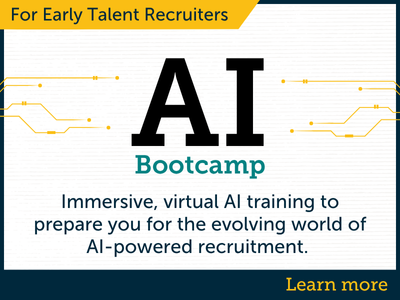NACE Journal / Summer 2024
Job applicants and employers typically have the same goal in mind during the course of the hiring process—find the best fit. The employer wants to find a candidate who has the best ability to perform the essential functions of the job. The job applicant is searching for a job that satisfies their personal goals, whether those goals relate to compensation, geographic location, potential opportunities for growth, or a combination of factors. Both parties are looking for something that meets the goals that they have established.
However, this is easier said than done. Job applicants must wade through opportunities while employers wade through applications. To do so, employers may use multiple avenues to screen potential candidates. These avenues include 1) creating the job description, 2) creating the written application, 3) conducting the interview, 4) determining which background screening methods to use, and most recently, 5) navigating the use of artificial intelligence (AI).
Each avenue contains potential legal liability for the employer if not conducted correctly.
The Job Description
The job description is the first potential slip-up that the employer may face during the hiring process. When drafting the job description, employers should spell out the duties and responsibilities of the job in question. This description should describe the job generally and then move into specifics. The job description should also objectively list the required job qualifications and any job prerequisites, e.g., a master’s degree, proficiency in a certain software, or proficiency in a particular skillset. It is also prudent for the employer to add an equal opportunity statement and specify that the job posting does not act as a formal offer or guarantee of employment. Most importantly, the job description should not imply any preference for an individual of a certain sex, race, age, religion, or other protected characteristic.
The Written Application
Employers must be mindful of the application their organization uses to screen potential applicants and ensure that this application is in compliance with local, state, and federal laws. Most employers are aware that there are certain questions that should not be asked on an application, such as those related to the candidate’s race, religion, or disability, but some are less aware of other types of questions that could violate the law. For example, the job applicant should not be asked to disclose the date of his or her high school graduation, which would give the employer information to determine the applicant’s age. Similarly, applications should not include questions about illnesses or injuries that might impact the applicant’s ability to do the job; instead, the employer can ask if the applicant can perform the essential functions of the job.
“Ban the box” laws
Employers must be mindful of local, state, and federal laws that limit an organization’s ability to ask a question related to an applicant’s criminal background. As a general matter, a criminal history can only be used to exclude a candidate if it resulted in a conviction and is an offense that would essentially preclude an individual from performing the job for which they have applied. For example, if an applicant has a retail theft conviction from 20 years ago, that generally should not preclude that person from being hired as an office manager today. Conversely, if an applicant has five drunk driving convictions over the past five years, an employer may not want to hire that individual as a driver.
As of late, state and local governments have and continue to take additional steps to protect job applicants. These additional protections have come to fruition in the form of “ban the box” laws. These laws essentially prohibit the employer from requesting an applicant’s criminal history on an employment application and from making such inquiries until after the written application is submitted by the candidate, after the interview process, or after a conditional offer is extended to the candidate. These laws differ by state and locality and are frequently amended. In addition, in certain circumstances, there are exceptions to the laws. For example, there is an exception when an employer is legally required to conduct a background check, such as employers that are governed by child welfare laws.
Medical marijuana and employment
Another recent issue facing employers is the medical marijuana conundrum. While marijuana is still a Schedule I narcotic (the same as cocaine and heroin), a significant number of states have legalized marijuana in some form, for medicinal and/or recreational use. Each state that has legalized marijuana, medical or otherwise, has specific laws that pertain to the employment realm. Accordingly, employers must be aware of their state-specific laws and requirements. Generally, the laws prohibit employers from discriminating against an individual solely for having a medical marijuana card. As such, employers should not disqualify applicants merely if they disclose such information during the application process. The individual with a medical marijuana card should be afforded the opportunity to complete the hiring process the same as all other applicants. What an employer ultimately decides to do with a positive test for marijuana in a post-offer drug test must be in compliance with its own internal policies and the applicable law.
The Interview Process
When it comes to the interview itself, there are certain questions that are off-limits for employers. State and federal anti-discrimination laws prohibit employers from eliminating an applicant based upon their protected classifications, which include, but are not limited to, an individual’s race, color, sex/gender, age, national origin, religion, or disability. Additionally, many states now include sexual orientation and gender identity as protected classifications. Employers are also prohibited from engaging in practices that disproportionately limit employment opportunities that are not related to job requirements or business needs.
As such, interview questions should be limited to determining if an applicant is able to perform the essential functions of the job. Questions asked of all applicants should be similar, if not exactly the same. Employers are permitted to ask questions based upon a bona fide occupational qualification. This means that employers are permitted to ask applicants if they have a valid driver’s license, the ability to stand for periods of time, or a required degree, if such qualifications are necessary to perform a given job and are essential to the operation of the employer’s business. Employers should not ask an applicant if they have sued a prior employer or inquire about an applicant’s medical conditions during the interview process. (Note: Regarding the “have you sued” question, the Equal Employment Opportunity Commission has stated that such a question is a form of illegal retaliation that could expose an employer to potential liability. Regarding the medical inquiry, an employer may not ask the applicant what possible accommodations they need to perform the position until after a job offer is made, unless the applicant has an obvious disability that the employer reasonably believes would require an accommodation or the candidate has voluntarily disclosed the need for an accommodation.)
Employers may, however, determine if an individual is able to perform the essential functions of a job. This can include the use of a preemployment test during the interview process, including an aptitude and skills test. An aptitude and skills test may be done pre-offer, provided that it does not constitute a medical test. An employer may not use such tests unless the test is both job-related and consistent with business necessity. The employer must also administer employment tests effectively so that test results accurately reflect the skills, aptitude, or other factors the test measures and do not reflect an applicant’s impairment. Finally, the employer must make reasonable accommodations to the known physical or mental limitations of an otherwise qualified applicant with a disability during the testing process, unless the accommodation imposes an undue hardship.
Interview questions
Employers must ensure that they are in compliance with state, federal, and locallaws that pertain to the hiring process. Employers should review and revise their applications to confirm compliance with applicable laws and should have internal policies that indicate what occurs during the interview process and how applicants are screened out. The hiring process must be consistently applied to all applicants to ensure compliance with the laws. Most importantly, employers must train all interviewers thoroughly to confirm that such individuals know what to say, what not to say, and how to act during the interview process. The interviewer is the individual who will ultimately protect a company from liability. (See “Interview Do’s and Don’ts.”)

Background Checks
In addition to issues related to what is included in applications, employers face potential hiccups based on what is excluded. For example, if an employer intends to conduct a background check on an applicant, it must comply with certain legal requirements set by state and federal law. Generally, this would include getting authorization from the applicant, which is typically collected through the application. In terms of the federal law, the Fair Credit Reporting Act (FCRA) provides standards for applicant screening. Under the FCRA, if an employer uses an outside consumer reporting agency to conduct a background check, it must abide by a set of rules and regulations. The FCRA states that certain information cannot be disclosed in a consumer report. This information includes civil suits, records of arrest after seven years, and accounts placed for collection after seven years.
The FCRA also mandates that, prior to obtaining a consumer report, an employer must get written authorization from the applicant. As such, the written application should include specific language that obtains the required authorizations from the applicant and provides the necessary disclosures mandated by the FCRA. It should also be noted that some states, including California, impose additional hurdles for employers if they intend to use a background check. Consequently, employers should be careful to know and abide by the laws of their specific state in addition to the FCRA.
Additionally, if the employer intends to eliminate a candidate based upon the information in the FCRA report, it must give the applicant a copy of the report and an explanation of their rights under the FCRA, which includes the right to dispute the accuracy or completeness of the information in the report. The FCRA limits only apply if an employer uses an outside consumer reporting agency. If an employer conducts its background check internally, it is not bound by the FCRA’s limitations.
The Use of Artificial Intelligence
With the rise in AI, predictive analytics, and machine learning in recent years, employers now have the ability to integrate these algorithmic decision-making products into their preexisting hiring and recruitment processes. This includes resume screenings, candidate matching, interview scheduling, probability analysis, performance evaluations, and layoff decisions.
It has been estimated that 55% of companies are increasing investments in these types of AI recruiting measures. The general idea behind the use of AI in the hiring process is to increase objectivity, improve the likelihood that the right candidate is selected, and decrease the recruitment timeline. Objectively, these are all good reasons to integrate AI into an employer’s hiring selection process, but this integration also comes with inherent risks. The most prominent risk resulting from the integration of AI is unintentional discrimination.
Inherent legal risks of AI in the hiring process
One might think that an emotionless “robot” would be able to help employers achieve their hiring goals without issue. However, AI is only as good as the human counterpart that programs it and the information on which it is trained. If not trained properly, AI can unconsciously create or even increase biases in the recruitment process. For example, if the AI is trained on biased or small-scale data, it can exclude qualified candidates from certain demographics and lead to discrimination based on a candidate’s age, religion, sex, race, national origin, or disability.
Based upon these inherent risks, employers must carefully establish how they are going to implement and integrate AI into the hiring process. Employers cannot wantonly implement AI assessment tools without understanding how these tools were created, what data they were trained on, and the results that they have produced. If it is an employer’s end goal to use AI to screen out candidates, the employer must ensure that the AI tool used complies with applicable antidiscrimination laws. Ultimately, if a preemployment hiring test or screening software has the potential to discriminate against individuals in a protected class, it should be eliminated from the employer’s hiring process.






